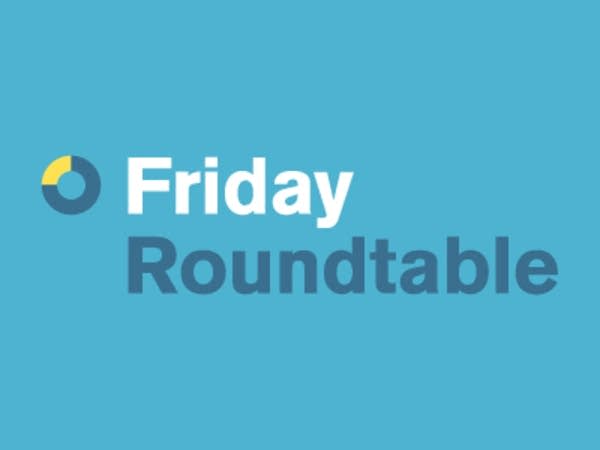'Six things I wish I'd known when I started teaching'
Go Deeper.
Create an account or log in to save stories.
Like this?
Thanks for liking this story! We have added it to a list of your favorite stories.

Our guests this week are all experienced teachers who will share the six things they wish they had known when they started teaching.
Book picks from our guests:
Peter Redmond: James Brown Reader
Ryan Vernosh: Inferno by Dan Brown
Turn Up Your Support
MPR News helps you turn down the noise and build shared understanding. Turn up your support for this public resource and keep trusted journalism accessible to all.
Carolyn Fruin: Periodic Tales by Hugh Aldersey-Williams
Here are our guests' lists:
Carolyn Fruin, Educator services coordinator with Sophia.org
1. Not everyone is like me - a lot of people don't like learning or school.
2. It's all about the authentic relationships you have with the students in your class. Classroom management, lesson plans, content, etc don't play near the role in being an effective teacher as does a genuine concern and understanding of the kids in front of you.
3. Develop a thick skin soon - especially in the age of email. People don't perceive you as an emotional, sometimes fragile person and can say some pretty tough things as they respond to a struggling teenager.
4. You're walking in an idealist, strive to stay that way. Do this by getting involved, accepting change and launching your ideas in "beta" mode.
5. Although it may seem like technology has gotten to a slowing pace, it hasn't. The electric typewriter did not turn out to be the end all be all even when white out and a backspace button came along.
6. If you give kids the chance to own their own learning, they will. There are creative, wonderful teenagers out there waiting to bloom - don't try to "force bloom" the flower.
Peter Redmond, Language arts teacher at St. Louis Park High School:
1. How to time and pace different lessons
2. Knowledge that students' home environment affect their school performance
3. The importance of parent involvement
4. Knowledge of the politics of public school funding and teacher pay mechanism
5. The effect of the internet, specifically as it relates to plagiarism
6. The significant affect we have on students' lives; the power of a teacher is not a cliche
Ryan Vernosh, 2011 Minnesota Teacher of the Year:
1. Re-frame the idea of family/community involvement to that of building partnerships with families. Honor the fact that families are the first expert and teacher of their children. Learn from them of how to best serve their child in school.
2. Classroom control does not necessarily equal learning. Remember that the one doing the most talking is usually the one doing the most learning so don't be afraid to let students talk and engage throughout the lesson.
3. Prioritize the building of reciprocal relationships with all students while understanding that those relationships alone are not enough. They are a prerequisite to learning, but it is in how we maximize those relationships to foster collective and individual achievement that matters most.
4. Trust students with curriculum. Listen to what students are bringing into the classroom and use that to guide the teaching and learning in your classroom community. Allow our young people to steer the direction of the curriculum ultimately leading to the standard being addressed. I often tell my students that there is more than one way to get from St. Paul to my hometown of Green Bay. I can take the most direct route, but I can also get there via Madison and Milwaukee. It may take longer but it also may be more engaging and interesting along the way. The same holds true with what we teach. We want to learn the standard, but how we get there is up to us.
5. Give yourself time to learn. There is a fierce urgency in the classroom, especially for students and families that have been marginalized for generations, but do not expect perfection of yourself. The pursuit of constant perfection often paralyzes progress - but apparently not alliteration after reading that last sentence:-)
6. Be humble. Do not think you ever have teaching figured out. As a teacher very interested in the intersection of policy and practice, I would not have nearly the understanding of the complexities of teaching and learning after only 2 years in the classroom. I simply would not have any real sense of what the implications of policy are for everyday practice.
LEARN MORE ABOUT TEACHING:
• Words of Wisdom from Top Educators
"National Teacher of the Year: Sarah Wessling:
'Motivating our students means knowing our students.'
"Arizona Teacher of the Year: Joy Weiss: 'Being passionate about everything you're teaching and being real with your students are the top two motivations that our students need.'"
• Uncommon Wisdom on Teaching
"It's true that every nation has unique characteristics of its teaching profession. Few countries can simply adopt wholesale another nation's system for recruiting, training, and compensating teachers. Yet many high-performing nations share a surprising number of common challenges to securing a high-quality teaching force. Many top-performing education systems face looming teacher shortages — and similar stumbling blocks to preparing, rewarding, and retaining top-notch teachers." (Huffington Post)
If you're a teacher, what do you wish you had known that first school year?




